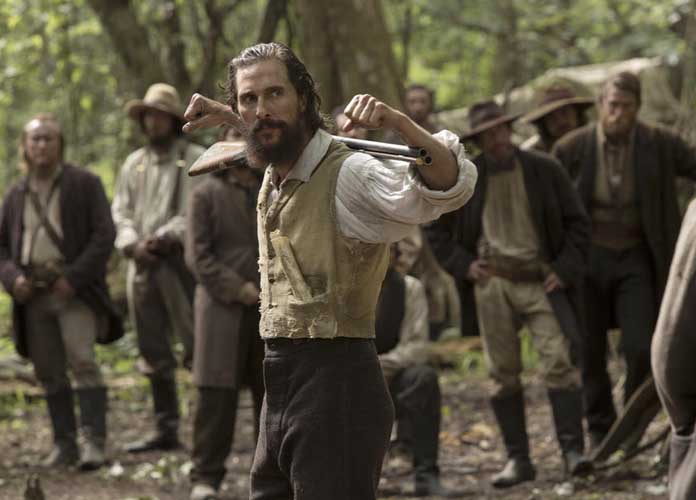‘Free State of Jones’ Movie Review: Emotional Ride Through Civil War-Torn Mississippi

4/5
Free State of Jones takes viewers on a ride through rural Mississippi during the Civil War, captained by Newton Knight (Matthew McConaughey), in search of a moral compass.
‘Free State of Jones’ Movie Review
The film, which hits theaters today, exposes the struggles of Reconstruction in the South, while uncovering the Confederacy’s dastardly deeds in the face of food and clothing shortages on the front lines of war.
Set in Jones County, Mississippi, Free State of Jones begins with Newt Knight (McConaughey) serving as a nurse on the front lines of battle against Union forces.
FREE STATE OF JONES TRAILER
Soon Newt establishes a small commune within the swamp lands of southeastern Mississippi, composed of mostly black farmers hiding out from Confederate companies who seek to hang them.
Slowly the community grows, bolstered by the additions of Newt’s compatriots from the front lines and the poor farmers whom had their plots pillaged by the Confederacy.
Newt’s new friend Moses (Mahershala Ali), serves as the pure, voice of reason throughout the film, stealing every scene he is pictured with a subtle sadness and palatable painstaking journey to be viewed as a man, no more, no less.
Viewers will love to hate appropriately named Lieutenant Barbour, played by Bill Tangradi (Argo), as he continues to follow orders at the risk of his own life, the lives of his men, and their humanity in general.
Free State of Jones weaves through the Civil War and Reconstruction highlighting all the pertinent points that casual moviegoers would not have been exposed to unless they took a college-level course on the conflict.
The climax of this historical understanding comes when Moses explains to a few confidants that “we are free, and we aren’t free,” pointing squarely at the Black Codes and sharecropping as institutional discrimination, aimed at restricting the upward mobility of the black race.
Despite the film dragging a bit in the second 20 minutes, overall, viewers are treated to an emotional rollercoaster ride through the Civil War, with all the battle scenes one could expect from an epic, and all the plotlines and acting performances expected from an artistic piece.
Free State of Jones will teach you lessons about the hardships for both races during the Civil War, while weaving together the “love conquers all” mantra, as musket balls buzz by a character’s ear.
‘Free State Of Jones’: Synopsis
In the first scene, viewers are served a precursor of gory battles to come, offering all the grueling details of war, including the sounds of a saw cutting through a man’s wounded leg.
Knight navigates around expired human obstacles in search of wounded soldiers he can help, but after a young boy he calls “kin” is shot in the chest and soon passes, Newt realizes that medical attention is prioritized by rank or status.
Subsequently, he reaches the conclusion that the amount of wounded soldiers he can reach is irrelevant if they are forced to wait behind Captains and Generals to gain the care they desperately need.
As a result of this epiphany, and the loss of his “kin,” Newt straps the fallen boy to a stolen mule and deserts his post, heading home to Jones County.
It is there that the film’s narrative begins to take shape.
Newt’s wife Serena (Keri Russell) is forced to move after a company of Confederate soldiers, charged with collecting goods from local farms and hanging suspected deserters, comes looking for her husband. Newt himself, wounded by one of the company’s tracking hounds, is pushed into the swamp lands where he seeks respite and hides out.
The swamp uncovers a small community of black and mixed race men and women, who are attempting to stay off the Confederate company’s radar, fearing certain death should their hideout be discovered.
As the soldiers continue to confiscate nearly every means of sustenance on the farms of Jones County, Newt rallies the community around the assertion that the war is being “fought for cotton,” it is being waged with “the poor man fighting, so the rich man can get richer.”
Several times the confederate company seeks to quell the uprising, but Newt and his new kin use guerilla tactics to surprise and kill several of the men, taking from them the goods they pillaged from local farmers.
While Newt’s community swells, so does his admiration for a Creole “healer” named Rachel, played by Gugu Mbatha-Raw, whose most notable role prior came as the wife of Will Smith’s character in the 2015 film Concussion.
As the relationship of Newt and Rachel builds, so does the resolve of their new community.
Following the gruesome hanging of three young boys and a confidant, Newt’s clan launches a surprise attack at the burial, killing nearly the entire company and their commanding officer.
Newt announces the community will secede from the Confederacy, declaring itself the “Free State of Jones,” and they hoist the American flag in a show of solidarity.
The film jumps back to the 20th century on a few occasions, showing Newt’s great grandchild Davis Knight (Brian Lee Franklin), standing trial for breaching miscegenation laws still in place in Mississippi during the 1940s.
These laws barred interracial marriage, and as a descendant of Rachel and Newton Knight, the court declared Davis Knight’s marriage void, due to the fact that he was “one eighth” black.
Davis Knight’s marriage is annulled by the court, but ultimately that decision is overturned by the state’s supreme court for fear that the federal government would intervene.
Eventually Newt and others escape the area to set up farms to the north. But the road to the finish line was not without tragedy.
After receiving notification of the 13th Amendment, Newt and his band of mostly black Jonesians attempt to vote in the election of 1876. Only two of their votes are counted, and soon after, Newt’s best friend Moses is lynched for his leadership regarding enfranchisement and education in concert with the Freedman’s Bureau.
The journey concludes with Newt and Rachel set up on their own plantation with crops and all the other means for sustenance.
RELATED ARTICLES
Get the most-revealing celebrity conversations with the uInterview podcast!



 Click here for the Cannes Film Festival 2015: Best Dressed Slideshow
Click here for the Cannes Film Festival 2015: Best Dressed Slideshow



Leave a comment